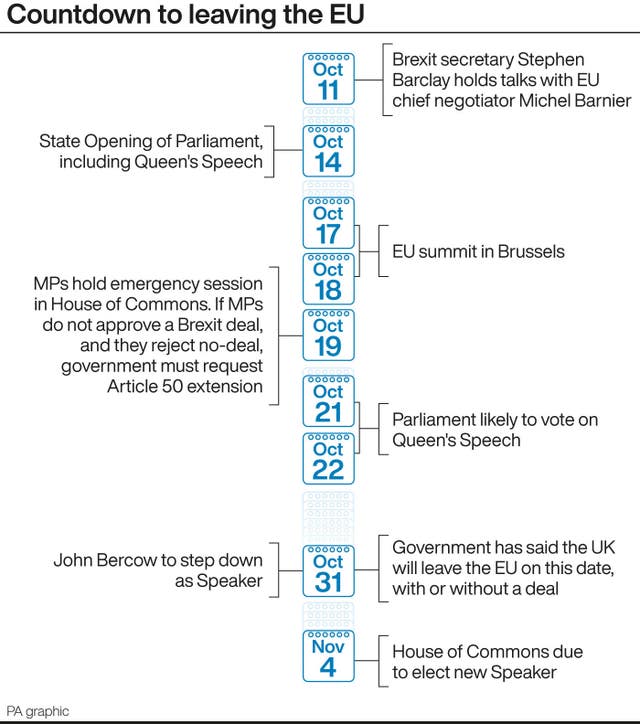Brexit talks to enter intensive ‘tunnel’ phase in boost for prospects of a deal
The glimmer of hope came after EU chief negotiator Michel Barnier and Brexit Secretary Stephen Barclay met in Brussels.

Brexit negotiations will now enter the “tunnel” phase of intensive and secretive talks in a major boost for Boris Johnson’s prospects of brokering a fresh deal.
The accelerated negotiations were agreed to by the EU27 after a “constructive meeting” between the bloc’s chief negotiator, Michel Barnier, and Brexit Secretary Stephen Barclay in Brussels on Friday.
After talks came close to hitting the buffers, the Prime Minister managed to win some confidence that he can secure an agreement after meeting Irish Taoiseach Leo Varadkar.

He also cautioned that it is not yet a “done deal”, adding: “There’s a way to go. It’s important now that our negotiators on both sides get into proper talks about how to sort this thing out.”
The pound rose for the second day on international money markets as traders welcomed signs that a Brexit deal may be possible.
Meanwhile, European Council president Donald Tusk handed the PM a last-minute reprieve to secure an agreement, but warned that the UK still has not presented a “workable, realistic proposal”.
Mr Barclay and Mr Barnier were dispatched after the two prime ministers held face-to-face discussions in the Wirral on Thursday, prompting the leaders to “see a pathway” to a possible agreement.
Both camps hailed Friday morning’s discussions as “constructive” and Mr Barnier went on to meet the EU27 ambassadors who, the European Commission said, agreed to “intensify discussions over the coming days”.
This takes the negotiations into “the tunnel”, which is Brussels jargon for an in-depth phase of talks among a select group of negotiators designed to minimise leaks.
But he ruled out making that declaration, offering to hold out for the “slightest chance” of success, after speaking with Mr Varadkar.
“I have received promising signals from the Taoiseach that a deal is still possible,” Mr Tusk said.
“Of course there is no guarantee of success and the time is practically up but even the slightest chance must be used.”
A short while later, Mr Barnier hailed the “constructive” talks with Mr Barclay.
Mr Barnier compared the UK’s departure from the European Union to climbing a mountain, stressing the need for “determination and patience”.
A statement from the UK Government also described it as a “constructive meeting”.
The meeting between Mr Johnson and Mr Varadkar came after a week of acrimonious exchanges between London, Dublin and Brussels signalled the talks were close to collapse.
Anonymous Downing Street sources accused Mr Varadkar of backtracking on previous commitments to try to find a deal, and of refusing to negotiate.
And Number 10 sources claimed the EU was making it “essentially impossible” to leave with a deal after a heated telephone call between Mr Johnson and German Chancellor Angela Merkel on Tuesday.
But the mood significantly shifted after the wander on the Wirral between the two premiers.
The change prompted speculation of a compromise on the contentious issue of the Irish backstop to prevent a hard border returning to the island of Ireland.
The Taoiseach said a deal was possible after more than two hours of talks but warned that “there’s many a slip between cup and lip”.
He refused to be drawn on any “concessions” made by either side, while UK Government sources would not comment on Irish press reports suggesting “significant movement” by the UK.
The PM must return from the crucial summit of heads of government with a deal he can get past MPs by October 19 if he is not to face demands to comply with the Benn Act.
This would see him asking for a Brexit extension to the end of January, but he has said he would rather be “dead in a ditch” than request a delay.
Despite saying he will abide by the law, the PM has said he will leave by the October 31 deadline “come what may”.
Government sources have said ministers are preparing to hold an emergency Saturday sitting of Parliament on October 19.

But if a deal is forthcoming he would need the backing of the DUP and hardline Brexit-backing Tories to give it any chance of getting it through without opposition support.





